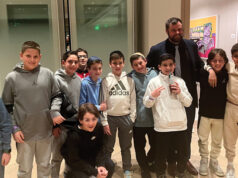
The Yeshivah of Flatbush Ladies Auxiliary recently presented its 2nd Annual Parenting Powerhouse. Parents were treated to the insights and wisdom of several community parenting experts as well as a delightful lunch, all in the comfort of the home of our gracious hosts, Ricci and James Haddad.
The first speakers of the day, Harvey Bachman and Ruth Waide, both from the Yeshivah of Flatbush Office of Pupil Personnel Services, spoke to a captivated audience about minimizing the stress of parenting through parenting positively. They recommended that parents: (1) Maintain Good Communication—listen actively, choose words carefully, and be mindful of their tone and body language; (2) Discipline Effectively—define rules, boundaries and expectations, choose battles, let children make and learn from their mistakes, and keep their child’s developmental stage in mind when making demands on them; and (3) Promote Positive Self-Esteem—steer children toward areas in which they excel, encourage their efforts, provide unconditional positive regard, and separate children from their behavior—kids aren’t ‘bad,’ but their behavior may be unacceptable.

They emphasized the importance of parents taking time for themselves to relax and rejuvenate, and they let us all in on a little secret—when our kids get together, they are plotting! They have a leader, they make a game plan and they take on issues as a team. As adults we need to make time to work together to create a plan for our families. Mr. Bachman and Mrs. Waide reminded us that we need to emphasize quality of life and not let ourselves become too busy with life’s distractions to enjoy the limited time we have with our young children—before they grow up!

Licensed Clinical Social Worker Shlomo Lieberman spoke next about granting our children freedom and where wise parents draw the line. Mr. Lieberman spoke about setting limits for our children and why we set them—the long-term reason: so that our children will make the right choices when they are on their own; the short-term reason: to keep our children safe and healthy.
He spoke about conflict between parents and children as being an opportunity for education. When your children question your limits, it shows they are thinking for themselves. When we share our reasons for the limits we set, we change the dynamic from trying to control our children to helping to educate them.

Mr. Lieberman also advocates setting different limits/rules for different children (forget about even or fair treatment) depending on their temperament and track record.
Finally, he spoke about knowing what’s negotiable and what’s not. If every rule in your house is negotiable, then there are no rules. If, however, every rule in your house is non-negotiable, then you can expect your children to go behind your back. The idea here is that children need to become independent and they will do it, either with you or behind you. Mr. Lieberman gave us a clear view of our goal as parents— to have our children become independent with us—as well as several ideas toward achieving that goal.

Mrs. Frumie Churba spoke to us about our roles as mothers—instilling faith and a love of Hashem in our children, while building our children’s self-esteem and confidence. Her practical suggestions included: making time for our children when they come home—work, talk and play games with them, each according to their level; creating a warm, welcoming open home—add food, song and laughter and your kids will often rather be home than be out; and keeping in mind that children will do childish things—it is often best to ‘leave it alone.’ Remind yourself that a situation or stage will pass and it will be all right.
When asked how not to get emotional and take things personally when your children behave disrespectfully, she gave a priceless piece of advice: Pretend they’re not your children! Figure out why the child is acting this way and respond to the underlying problem.

Mrs. Churba emphasized the importance of looking for solutions to our challenging situations and of recognizing that challenges exist in order to increase our awareness of what Hashem has given us. Mrs. Churba spoke proudly about her daughter who, in response to her own special challenge, created Torah for Special Children—a program designed to provide a Torah education to Down syndrome children within our community.
Mrs. Churba’s words were both inspiring and enlightening, reaching deep into the hearts of the mothers present.
Our final speaker of the day was Rabbi Dr. Simcha Cohen, who spoke to us about siblings without rivalry. We were encouraged to interact with our children according to their specific temperaments andneeds and to understand that in a family there is no such thing as ‘fair’ or ‘even’ treatment. Conflict often arises from efforts to make things ‘fair.’ When children feel wronged, it’s best to address the emotion: “You’re upset, I understand, let’s focus on that.”
While we must teach our children flexibility, compromise and sharing, we also need to create an environment that reduces conflict. When children share a room and space is limited, it’s important for each child to have a drawer, shelf or box for items they do not wish to share. When there is conflict it’s best to use a problem-solving approach than to focus on the actual conflict. For example, common areas such as bathrooms are often the source of conflict—we know arguments will happen. As parents we need to defuse the arguments and help solve the problem. This is how we can teach our children problem solving. When our children do fight, instead of responding with anger, threats, sarcasm or guilt, we should offer normal nondirective comments such as, “We don’t fight in this house.”
As for children irking each other, this behavior is normal among siblings and just knowing that should help you defuse these situations. Often we can give a child individualized attention on a certain issue (an issue they are struggling with) and turn them into a strong advocate on the issue.
Dr. Cohen left us feeling hopeful that while sibling rivalry will always exist, we can get a handle on it!
Throughout the course of the day, more than 80 parents came to listen to what the experts had to say. Ultimately, these compelling speakers provided us with powerful tools to add to our parenting toolboxes, as well as the motivation needed to implement new strategies and to use our new-found tools successfully. The 2nd Annual YOF Parenting Powerhouse was truly an enjoyable and empowering day.
___________
Lisa Melamed is a Yeshivah of Flatbush parent and a Ladies Auxiliary board member.



